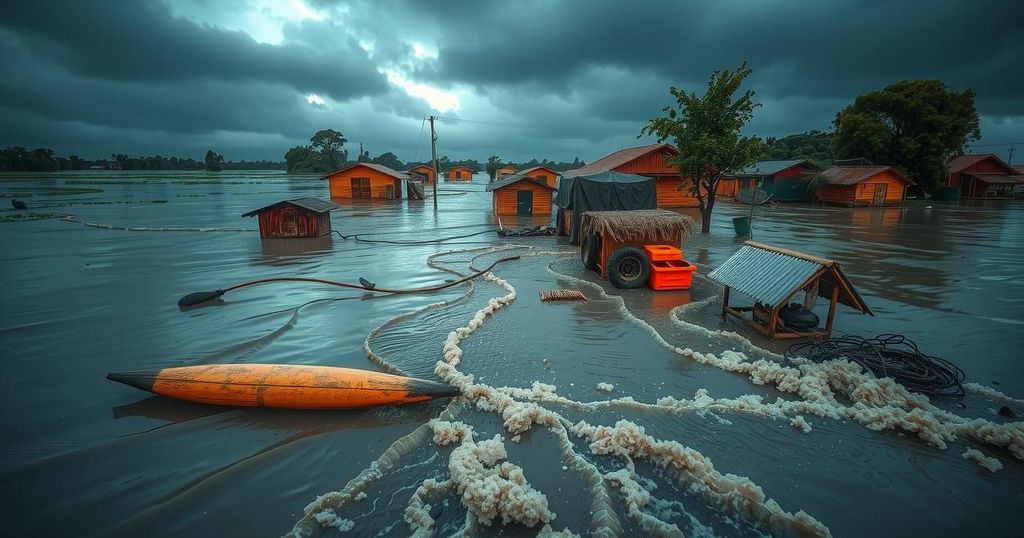Recent research indicates that severe floods in Cameroon, Chad, Niger, Nigeria, and Sudan were worsened by climate change. The World Weather Attribution group reported that rainfall in these areas has become 5-20 percent more intense due to global warming, resulting in significant loss of life and displacement. Experts predict that such extreme weather patterns are likely to escalate if global temperatures rise, calling for urgent international actions and investments in disaster preparedness.
Recent devastating floods in several African countries, including Cameroon, Chad, Niger, Nigeria, and Sudan, have been exacerbated by climate change, according to a report released by an international team of scientists. These floods, which have resulted in the loss of hundreds of lives and the displacement of millions, were intensified by human-induced climate change, with this year’s rains in the Niger and Lake Chad basins being recorded as 5-20 percent more intense than usual due to global warming. The study from World Weather Attribution (WWA) warned that if current warming trends continue, such extreme rainfall events are likely to become a regular occurrence. Izidine Pinto, one of the study’s authors from the Royal Netherlands Meteorological Institute, remarked that heavy summer rainfall has become a consistent pattern in the affected regions, indicating a concerning trend. He highlighted the necessity for urgent actions at the upcoming UN Cop29 climate summit to shift away from fossil fuel dependency. The recent floods resulted in approximately 1,500 fatalities and displaced over one million individuals, while also overwhelming infrastructure such as dams in both Nigeria and Sudan. The severity of these floods, which occurred over the months of June to September this year, significantly exacerbated the ongoing humanitarian crisis in Sudan, limiting the capacity of aid organizations and governmental responses. Experts estimate that should global temperatures rise to 2 degrees Celsius above pre-industrial levels — a scenario potentially realized by the 2050s — such heavy precipitation will likely become an annual event in affected regions. The WWA has called for immediate investment in early warning systems and enhancements to dam infrastructure to prepare for future floods. Joyce Kimutai, a researcher at Imperial College London’s Centre for Environmental Policy, pointedly remarked on Africa’s minimal contribution to global carbon emissions while facing the most severe consequences of climate change, urging that rich nations must provide significant financial support at the forthcoming climate summit.
The increasing frequency and intensity of extreme weather events globally is largely attributed to human-induced climate change. In Africa, where many regions are already vulnerable due to socioeconomic factors, climate change exacerbates existing challenges, leading to devastating consequences such as severe flooding. The recent floods in West and Central Africa underscore this issue, demonstrating that the combination of global warming and climatic variability poses a significant threat to human life and livelihoods. In light of these challenges, there is pressing need for international cooperation and funding to bolster regional resilience against such climate-related disasters.
The climate-induced floods that have recently impacted multiple African nations exemplify the urgent need for global action on climate change. Increases in rainfall intensity, attributed to human activities, have severe implications for affected communities, exacerbating existing vulnerabilities and leading to significant loss of life and displacement. The evidence presented by scientists emphasizes that without immediate action to mitigate climate change, such severe weather events will become increasingly common. The forthcoming Cop29 climate summit will play a critical role in shaping the future response to these challenges, with a clear mandate for wealthier nations to support affected regions through meaningful financial contributions.
Original Source: www.rfi.fr






